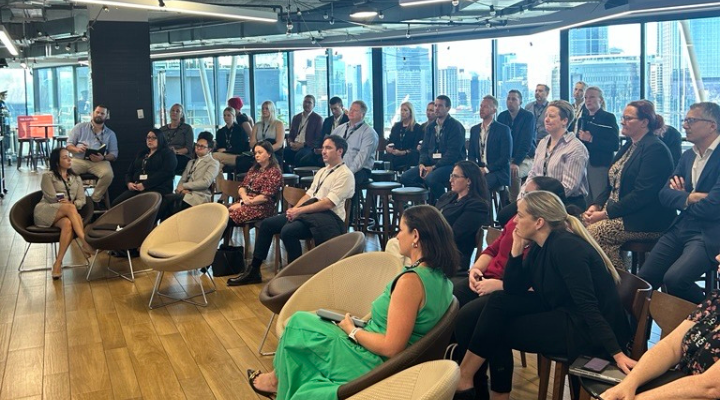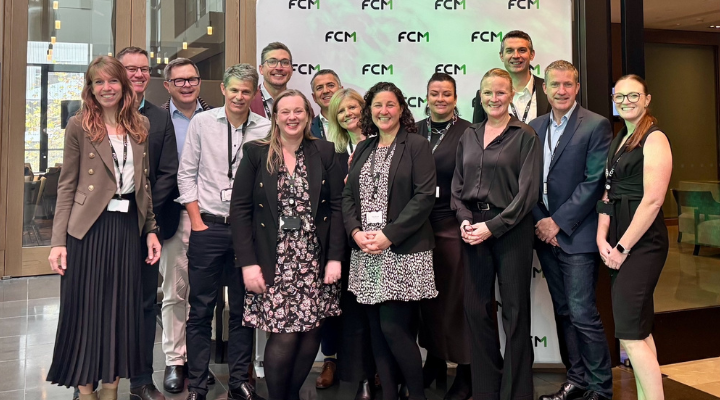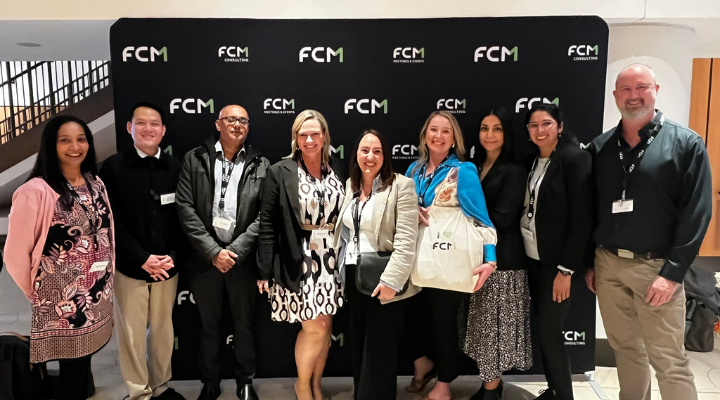Th!nk Australia 2025 highlights & action points

Thought-provoking, disruptive, and designed to make you think differently. In May and June 2025, FCM’s Th!nk series made its way across Australia, landing in Sydney, Melbourne, and Brisbane. Each session brought together a roomful of travel managers, decision-makers, bookers, and FCM experts to openly discuss the latest corporate travel topics circling everyone’s mind.
If you were in the room, thanks for joining us! If you missed it, here are the main talking points.
• Th!nk average rating: 9/10
• Trending topics: NDC, AI, OBT, Trends
Trends altering corporate travel
The curtain-raiser at each event was courtesy of FCM Consulting's Felicity Burke, Director of Consulting for APAC, who provided the crowd with a snapshot of the current and future state of aviation and hotels.
In the air, airline carriers are upping seat volume and getting bolder with schedules. "For the rest of the year, airline seats on offer will see a huge increase," said Felicity. "A 3.9% increase in seats doesn't sound too much, but that's a fair few seats. It's demonstrating airline confidence to schedule that far in advance and that high."
On the ground, it's high demand and high standards. With new and recently refurbished hotels entering the market, average room rates are still bouncing around, and so are service delivery models.
"Though these new hotels, often 4-5 stars, are increasing the traveller experience, they're also commanding higher rates because it's a completely different product coming online," she said. That means big gaps between the best available rate (BAR) and what you might be paying with pre-negotiated contracts. Especially in cities like Brisbane and Perth, where the price difference can hit triple digits. "If you don't have a contracted rate in Sydney, you are likely spending over $60 more per night or, in some cases, up to $400 more."
Another consideration is the growing role loyalty programs have in traveller decision-making. "Sometimes we forget perks and points, but they matter to your travellers," said Felicity. "All of these things are going to change the way that people want a book, and it's already happening. Particularly with this new generation that we have amongst us and your program.”

Travel trends action points:
• Review your accommodation contracts. Those BAR vs. contracted rate differences aren’t going away.
• Factor in status and loyalty programs. Lower-tier frequent flyers often get hit with baggage fees, longer boarding times, and less ancillary inclusions. Which adds cost in more ways than one.
• Keep an eye on the global travel industry. The year ahead is very much about expansion, innovation, and confidence.
NDC readiness and clarity
If your team is still trying to decode New Distribution Capability (NDC), you’re in good company. According to our live poll, most attendees said they’re “kind of ready”, with many others indicating “we are not ready at all”. FCM Australia and New Zealand General Manager Renos Rologas spoke about NDC with honesty.
“NDC will absolutely bring better fares and more personalised offers,” he said. “But it’s also creating some short-term friction, mainly when it comes to practical serviceability and customer alignment.”
“For instance, if you’ve got $50k in credits sitting in your system today, you might not be able to use those in an NDC world,” Renos explained. “Some airlines have manual workarounds; however, if you’re going to move into NDC, we would encourage you to use your credits before making that move.”
Under the surface, the transition to NDC is complex. Real-world examples from our NDC pilot highlighted how tasks that used to take FCM consultants 30 seconds now take longer as systems are still evolving. Despite the challenges, though, FCM believes in the future of Modern Air Retailing. We're investing heavily to close the gaps and ensure a stable, scalable solution is on offer to all customers.
“We’ve done a ton of training, built deployment teams, and developed change plans and programs in preparation for those who want to go live,” Ren said. “So, when we talk about NDC readiness, FCM is ready. And yes, there’s going to be an impact; it’s not perfect yet, but the impact will reduce over time as the tech matures.”
NDC action points:
• Undertake a credit audit. Find out how much you have in existing credits and work with your travel management company (TMC) to use them up before moving to NDC fares.
• Ask about NDC readiness. Don’t just assume your travel partner is ready. Ask what specific training, tech rebuilds and change teams they have in place to support your transition.
• Prep for teething issues. Factor in short-term disruption into internal workflows, communicate with people impacted, and set realistic expectations with stakeholders.
• Regularly check in with your corporate travel company for updates on capabilities and timelines, especially if you’re eyeing that 1 July date.
Making AI work for your travel program
To close, FCTG’s Chief Technology Officer, Australia and New Zealand, Grant Curry, spoke about the use of integrating artificial intelligence (AI) in travel programs.
“What’s underpinning AI development at the moment is enabling the masses and consumers of the world to solve problems quickly without knowing too much about technology,” said Grant. “There is tech, yes. But right now, with tools like ChatGPT and others, users are seeing instant answers without needing to have all the information.”
Many people in the room at Th!nk told us that their workplace uses AI, but they have very little structure or guidance on how to use it. And that’s the issue. “There’s a lot of tech out there looking to solve a problem,” said Grant. “We need to be really careful how we approach this AI buzz and make sure that we start to focus on solving the real problems and pain points, not just building a tool for the sake of it.”
One example of AI and machine learning being used in the travel industry hit close to home. “We’re starting to see multiple overseas airlines turn to AI to support on-time arrivals and departures,” said Grant. “Planes idling on the tarmac due to unavailable gates is a common problem around the world and one that we have all experienced." But AI integration has enabled these airlines to increase traveller experience, decrease fuel consumption, and help schedules stay on track, all by automating gate allocations.
Grant also gave attendees a look behind the scenes at how FCM is adopting AI internally, from establishing the AI Strategy and Integration team (formerly, AI Centre of Excellence,) and appointing a global Head of AI, to investing in company-wide training and tools. “A big part of our investment is ensuring that our people are ready to have a conversation with AI. Ready to let AI into their world, day to day.” More to come on FCM and AI at a later date…

AI action points:
• Forget the hype, focus on the real problems. Where do delays, bottlenecks, or inefficiencies happen in your travel program? That’s where AI can help.
• Challenge your TMC to show, not tell. Ask how they’re integrating AI to support your travel, including use cases that are already live and delivering results, not just concepts or roadmaps.
• Build digital confidence internally. Encourage your team to start experimenting with basic AI tools to boost comfort and awareness. AI is most powerful when widely understood and adopted.
• Stay future-focused. Even if AI adoption feels a little early stage, keeping an eye on what’s happening in this space now will give you an advantage down the line.